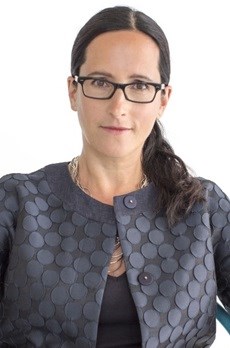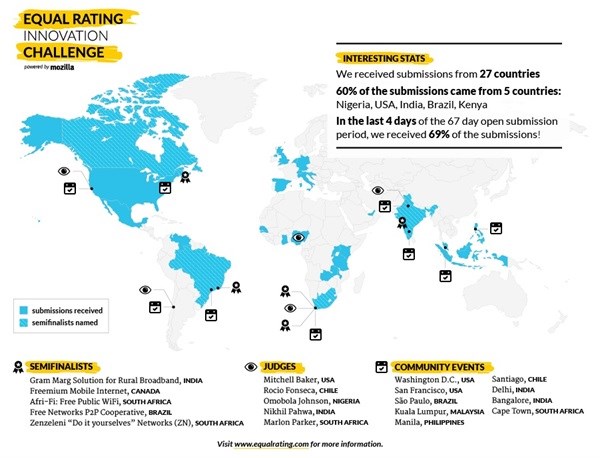Five semi-finalists have been chosen to progress to the next phase of Mozilla's $250,000 Equal Rating Innovation Challenge – a global competition to help catalyze new thinking around ways to connect the unconnected – and South African teams Afri-Fi: Free Public WiFi and Zenzeleni Networks are among them.

Katharina Borchert, chief innovation officer at Mozilla.
Katharina Borchert, Mozilla’s chief innovation officer, and Marlon Parker, RLabs founder and part of the Challenge judging panel, announced the chosen innovators at an event held at RLabs in Cape Town yesterday evening.
Elaborating on the importance of internet access, Parker said: “Not giving people access to information creates a socio-economic divide, not just a digital divide. Every person on the planet needs to have hope, which is what the internet is for. It gives you information, it gives you a choice, it gives you an option. This is why I wanted to be a part of this Challenge and become a judge.”
Borchert stated that the issues of access to the open internet is complex and creating universally-applicable and scalable connectivity solutions requires collaboration with people on the ground.
“It was important to collaborate with people that don’t sit in an office in San Francisco all day but that have local development experience, understand who the local audience is and what their challenges are. We thought an innovation challenge would be a good way to do that.”
Submission process
Entrepreneurs, designers, researchers and innovators were invited to propose creative ideas on ways to cultivate digital literacy and provide unfettered access to the open internet for anyone across the globe.
Mozilla received a total of 98 submissions, 60% of which came from five countries: Nigeria, USA, India, Brazil and Kenya. The diverse judging panel reviewed submissions against the criteria of compliance with Equal Rating, affordability and accessibility, empathy, technical feasibility, as well as scalability, user experience, differentiation, potential for quick deployment and team potential.
The five semi-finalists are:
Gram Marg Solution for Rural Broadband - India
• Team leader: Prof. Abhay Karandikar
• Open source low-cost hardware prototype utilizing television white spectrum to provide affordable access to rural communities.
Freemium Mobile Internet (FMI) - Canada
• Team leader: Steve Song
• A new business model for telecommunication companies to provide free 2G to enable all the benefits of the open web to all.
Afri-Fi: Free Public WiFi - South Africa
• Team leader: Tim Human
• Model to make Project Isizwe financially sustainable by connecting brands to an untapped, national audience, specifically low-income communities who otherwise cannot afford connectivity.
Free Networks P2P Cooperative - Brazil
• Team leader: Bruno Vianna
• Cooperative that enables communities to set-up networks to get access to the Internet and then supports itself through the cooperative fees, and while co-creating the knowledge and respecting the local cultures.
Zenzeleni “Do it for yourselves” Networks (ZN) – South Africa
• Team leader: Dr Carlos Rey-Moreno
• Bottom-up telecommunications co-operatives that allows the most disadvantaged rural areas of South Africa to self-provide affordable communications at a fraction of the cost offered by other operators.
Submission trends
While Mozilla will disclose further information about all of these teams and their projects in the coming weeks, some themes occurred in the overall submission process:
• Cooperatives were a popular mechanism to grow buy-in and share responsibility and benefit across communities. This is in contrast to a more typical and transactional producer-consumer relationship.
• Digital literacy was naturally integrated into solutions, but was rarely the lead idea. Instead it was the de facto addition. This signals that digital literacy in and of itself is not perceived as a full solution or service, but rather an essential part of enabling access to the Internet.
• Many teams took into account the unbanked and undocumented in their solutions. There seemed to be a feeling that solutions for the people would come from the people, not governments or corporations.
• There was a strong trend for service solutions to disintermediate traditional commercial relationships and directly connect buyers and sellers.
• In media-centric solutions, the voice of the people was as important as authoritative sources. User generated content in the areas of local news was popular, as was enabling a distribution of voices to be heard.
What’s next?
The semi-finalists will now be mentored by Mozilla, receiving advice and skills training in order to strengthen their concepts and expand their impact. On 9 March 2017 a Demo Day will be hosted in New York where the semi-finalists will present their concepts. This will be followed by a week of open voting on EqualRating.com, and the winners will be announced at RightsCon in Brussels on 29 March 2017.








































